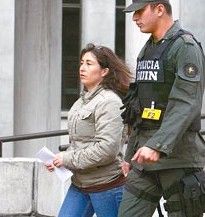NEWS RELEASE about SolidarityPolice/PrisonsPeace/War posted on December 16, 2010 by Guadillen
OUT OF SIGHT, NOT OUT OF MIND
Local group speaks out for imprisoned activists in Colombia
Local group speaks out for imprisoned activists in Colombia Windsor Committee in Support of all Political Prisoners in Colombia and Liliany Obando Villota (WCSCLO)
http://www.uwindsor.ca/socialjustice/system/files/Newsletter_2010.pdf
Mention Colombia and most people think of drugs and drug violence. Yet what gets less attention in our media is the reprehensible human rights situation in that country. According to the International Trade Union Confederation, Colombia is the most deadly place in the world to be a trade unionist. Trade unionists and human rights workers are often accused of being sup-porters of the guerrilla (FARC-EP). Humanitarians working in Colombia are routinely imprisoned by the state or killed by paramilitaries.
Take the case of Liliany Obando Villota. Liliany is known to Canadians thanks to her numerous visits to this country. In 2006 she spoke at the University of Windsor when the Centre for Studies in Social Justice and the Windsor Peace Coalition invited Liliany and a colleague to present on the work of their federation of farm worker unions, FENSUAGRO, and the situation of farm workers in Colombia generally. Her mission in Canada was to promote a human rights alert network among the peasant base for gathering information and reporting on human rights violations they encountered. For this work, Liliany has been imprisoned since 2009.
The Windsor Committee in Support of all Political Prisoners in Colombia and Liliany Obando Villota (WCSCLO) was founded in response to the jailing of Liliany Obando. WCSCLO is part of the International Campaign to Free All Political Prisoners and Prisoners of War in Colombia. We emphasize Liliany‟s situation due to our long-standing connection with her and respect for her work. As an organization we are gravely concerned by the reports coming from Colombia regarding her treatment and that of other political prisoners. Liliany, in particular, has been targeted for attack on numerous occasions inside El Buen Pastor Women‟s Prison. She is being unjustly accused for her work, and—without any evidence whatsoever of funnelling the money she collected on behalf of FENSUAGRO to the FARC-EP.
Unfortunately Liliany‟s situation is not unique. Thousands of innocent people find themselves deprived of their liberty in Colombian penitentiaries. The penal and prison policies put in place in recent years by the Colombian government have not resolved the sensitive problems faced by the prison population as a whole. On the contrary, they have given rise to an unprecedented worsening of the structural problems that characterize these “human warehouses.” Moreover, the systematic repression, stigmatization and criminalization imposed by the Colombian state on the different organizational initiatives of the popular sectors have spawned a gradual increase in the number of persons jailed for political reasons. Physical and psychological torture is a recurring practice in the government‟s treatment of political prisoners and prisoners of war. This is exposed clearly in the denunciation by the political prisoners of Patio 6 of the Buen Pastor Women‟s Prison in Bogota, who have stated that the National Penitentiary and Prison Institute (INPEC) engages in psychological torture and violates their fundamental rights. The women political prisoners of that jail have become a model of dignity and steadfastness. As a result, the State has singled them out for the abuse it continually visits on its detractors both within and outside its prisons. These brave women must not only face and suffer the structural problems of the penitentiaries and endure continuous repression because they are considered to be dangerous “terrorists” and enemies of the existing social and political order. Demanding justice Reading reports of these abuses has mobilized many Canadians to work in solidarity with Liliany Obando and other political prisoners in Colombia.
The Windsor Committee in Support of all Political Prisoners and Liliany Obando Villota demands that the Ministries of the Interior and of Justice of the Republic of Colombia and INPEC immediately enforce its policy of prisoner classification, in keeping with the nature of the punishable act as stipulated by both Article 63 of Law 65/93 and the national and in international norms that apply to the treatment and classification of prisoners, as the first step towards guaranteeing the safety and fundamental rights of the political prisoners. Likewise, we demand the complete and definitive cessation of the transfer of political prisoners to prisons far from their homes and families which is done in order to silence those who dare to denounce the grave humanitarian situation that prevails inside the penitentiaries. In accordance with international norms, political prisoners should not be housed in the same areas as para-military fighters and others who have threatened their lives.
It‟s clear that the strategy of the Colombian government is to disrupt any organizing processes that develop inside the prisons. The end desired is to morally and politically kill political prisoners and prisoners of war and, thus, to suppress all talk of the systematic and premeditated human rights violations occurring on a daily basis in Colombian jails. We the members of the WCSLO will continue to vocalize our support on behalf of those who face cruel and unjust imprisonment under the repressive regime in power in Colombia.
The site for the Vancouver local of The Media Co-op has been archived and will no longer be updated. Please visit the main Media Co-op website to learn more about the organization.
